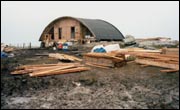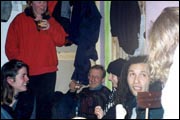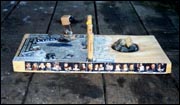| |

CASTAWAY (2000)
- buy this title from Amazon.co.uk


|
Forget 1900 House. The BBC were planning
to mark the Millennium with a project that would put the idea
of a family spending three months dressed up as Victorians to
shame. Castaway 2000 was going to be a groundbreaking experiment
in living with sustainable technology, combined with a snapshot
of the nation at the turn of the century. Such was the language
being bandied about by the originators of this project in which
thirty plus people, including families, were to be stranded
on a remote Hebridean island and left to survive on their own
for a year.
Those who watched the programmes or read the press coverage
(or indeed the book) know that it didn't turn out quite like
this. Poor planning and worse weather meant that the project
was late starting. Several of the participants turned out to
be rather more difficult than anticipated, refusing to move
into their 'castaway' accommodation until it was finished to
what they saw as an acceptable standard. A rift consequently
formed in the camp which was never quite healed; more crucially,
a mistrust of the production company making the programmes (Lion
TV) began.
Another unforeseen factor spoilt
the castaway ideal. The publicly late start to the experiment,
coupled with the success of four programmes describing the selection
of the castaways, meant that the show became fodder for the
tabloids - 'a national talking point' indeed. The antics of
the 'difficult' doctor and his wife, the easy telegenic charm
of blond public schoolboy Ben Fogle, the breakdown and departure
of bearded Mancunian builder Ray - all these things, to the
flattered bemusement of the castaways themselves, made front
page headlines.
| |
 |
| |
|
| |
Late start
|
| |
|
Remote though the settlement was, it wasn't
unaffected by this sort of publicity. The island was beseiged
with visitors. First journalists, then locals, then, as the
weather grew warmer, publicity-seeking chancers. A whisky company
landed a crate of their best Malt, a struggling pop band arrived
on the beach with a live Radio One link-up. As Ben (now a national
treasure) remarked, the experience was turning out to be not
so much 'castaway' as 'castupon' (see extract 1).
The experience of living in a closed
society that was constantly watched by TV cameras was also starting
to get to most of the participants. Many didn't realise how
much. When I flew in from the real world I was always struck
by the cabin-fever of the TV village. That the inhabitants were
an entirely artificial group with no common ideal or purpose
(other than, for some, a secret desire to appear on telly) only
made things worse. The tiniest differences and arguments were
repeatedly blown up into huge, camp-shaking rows.
As, around Easter, the first programmes
describing the actual experience were aired on national TV,
the unease grew. Though the castaways were supposed not to see
or know what had been in the programmes, letters from friends
detailed all. Others arranged for audio and video tapes of the
programmes to be smuggled onto the island. The participants
in the great sustainable technology experiment began to suspect
that they were nothing more than guinea pigs in a grand and
exploitative docusoap. Paranoia was rife, and the worn-out producer,
choppering in from Glasgow to offer reassurance, only managed
to stoke the flames.
As writer on the project, I was in
a strange position. Neither part of the TV company, nor yet
a resident castaway, I was nonetheless immersed in their life
full time in London, as I pored over the mounds of video diary
transcripts and tried to stitch thirty-six individual perspectives
into a clear and objective narrative. My visits, for a few days
once every six weeks or so, were always odd. Privy to the video
diaries, as well as private letters and other offered writings,
I often knew more about the dynamics of the group than those
living there did. (What X had said about Y in private was usually
concealed behind a tight smile on the island.)
| |
 |
| |
|
| |
Pod party
|
| |
|
Yet I was always at least a month behind
current events. Arriving in the windy settlement I would hurry
round with my tape recorder, trying to piece together the ever-developing
jigsaw of the truth. I got on well with almost all of the castaways,
and some of the interviews bordered on the confessional. But
there were still closely-guarded secrets, as well as things
I knew I would never be allowed to tell in the book. Sex, generally,
in the first category; the extravagant use of alcohol and other
stimulants in the second.
As the year continued, my relationship
with Lion subtly changed. At the outset of the project, the
Executive Producer had encouraged me to delve deep into all
aspects. Nor had he seemed shy of dissent, phoning me at home
in January, for example, to tell me that the doctor and his
wife had arrived in London and were thinking of leaving the
project, encouraging me to visit them and hear their criticisms
of the late start. But as the censure of Lion and the BBC grew
ever stronger on the island (till it eventually eclipsed all
other preoccupations) I began to get the feeling that my investigations
were no longer that welcome. My trips were restricted to two
or three days, and an upbeat production company angle on things
was always supplied.
Not that I minded. Having signed up to document one kind of
epic experiment, I now realised that I was the privileged recorder
of something altogether weirder and more interesting.
As August turned to September there was a crucial new element
to the picture - the success of the first Big Brother. In actual
fact, the initial ratings for this newest Reality TV programme
were well below those achieved by Castaway. But perception in
the media is all-important. August is a dull news month, and
the tabloids jumped on the antics of Nasty Nick et al with enthusiasm.
The worthier and more elaborate Castaway was suddenly seen as
a bit passé. The voracious setters of fashion had moved
on. Big Brother was the thing. Public perception remained that
it had always been more popular. 'The largest ever phone vote'
(much of which was multiple calling by enthusiasts) and other
such hype only served to cement that.
| |
 |
| |
|
| |
Settlement in summer
|
| |
|
Meanwhile, the stranded castaways were getting
more and more cynical about their own project. When I visited
at the end of September, to do final interviews for the Christmas
hardback edition of the book, I was hoping that the main Forming,
Storming, and Norming of the group would be over and they would
now be quietly Performing, winding down towards the end of the
project in twelve weeks time. Instead, I found them increasingly
restive. Dez and Liz, once among the most positive of the islanders,
were sitting around grumbling about how the whole thing was
a joke. Others talked about being 'sitting ducks' in 'a TV La
La Land' over which they had no control. Though they were of
course free to leave at any time, the islanders talked incessantly
of being 'trapped', 'exploited by Lion', and so on.
When I flew up to the island again
on Nov 1st, intending to garner a few final impressions for
an up-to-the-minute preface, I was shocked to find yet another
new drama sweeping across the camp. 'The biggest so far,' doctor
Roger told me with barely disguised glee. Lion's plan to install
a web cam in the steading (the main meeting place) was seen
by over half of the castaways as most definite evidence of 'Big
Brotherising'. Other BBC plans, to make the most of the project
with a series of short programmes running up to Christmas, to
stage some of the material to be broadcast in these programmes
(a home brew competition, for example), caused equal furore.
This was, the angry castaways told me, most definitely not what
they had signed up for. Sandy, the oldest castaway, protested
to producer Chris Kelly that the project had become nothing
more than a game show - the only thing lacking was a host. Kelly
then had to sheepishly break the news that for the New Year
live programming, the castaways were indeed getting a host.
| |
 |
| |
|
| |
Dez's Christmas present to Tanya
|
| |
|
The hardback was out, but the Castaway saga
was far from over. The very existence of the book - with all
its secrets about what A thought of B and C of D - now became
part of the story. One of the most rebellious of the castaways,
Ron Copsey, who had left the island back in June, sent copies
onto the island. Down in London I received a text message from
an islander who had a forbidden mobile phone. 'Book issue explosive,'
it read. 'Anger at Mike for his revelation to you of highly
personal info and late night pod talk irrelevant to the project,
but absolute fury more or less across the board at you for including
it in the book.' This was hardly what I wanted to hear. I was
contracted to return to the island one last time, to see the
final, televised New Year's celebration and write a couple of
round-up chapters for the paperback, due to be issued in February.
I went up with the Lion crew on the
27th December, a nervous figure as I stepped out from the helicopter
onto the pristine snow carpet of the island. The first person
I saw was film-maker Tanya Cheadle, who was cool. Next up was
Trish Prater, whose story of alleged child-neglect, extracted
from the book, had been all over the News of the World. She,
thankfully, was forgiving. 'You're a brave man,' she told me,
greeting me with a hug and her familiar, wheezing, affectionate
laugh. When Ben Fogle appeared, shaking his head in amazement
that I had dared to visit the island at all, I realised I wasn't
going to be lynched. There were however some painful scenes;
as always, when dealing with those you have written about, from
the least expected sources.
| |
 |
| |
|
| |
Castaways on a mountaintop
|
| |
|
But I and my book were merely a subplot now.
The community had split into two. In one camp were those who
were cheerfully co-operating with the production company, nicknamed
the 'telly tarts'; in the other those who had given up on the
project and were in high dudgeon with Lion, the BBC and all
its works. 'People who came here with wholesome motivations,'
said Liz, 'have had their heads turned.' Dez had actually enshrined
the split in a sculpture he'd given camerawoman Tanya for Christmas,
which featured the 'telly tarts' on one side of a fence, the
'real community' on the other, and Tanya and Ben straddling
the middle.
The split had as much to do - I reckoned - with personality
clashes and cabin fever as compliance or not with the cameras.
For when Lion produced a television and videos of the latest
programmes, almost everyone sat down eagerly to watch, and it
wasn't clear that the 'telly tarts' had got that much more coverage
than the refuseniks. Likewise, on New Year's Eve, there were
a good many of the so-called 'real community' who were happy
to take part in the televised finale, and only a principled
few who would have nothing to do with it.
| |
 |
| |
|
| |
Roger watches himself on TV
|
| |
|
I watched the castaways leave their now-beloved
island, most of them in tears. Then, after a comic Hogmanay
in Tarbert (described in the preface of the paperback), when
a selected group of the castaways were treated like pop stars
by local revellers, I flew home to write the last two chapters.
It was a shame to have to compress the complex events of the
final three months into such a small space, but that was the
nature of the project. The story had been written journalistically,
as the events happened. There was no chance to go back and revise,
trim earlier chapters to make space for later ones. But within
the parameters set by publication needs, I don't think we did
a bad job. (I say 'we' because editor Hannah and copy-editor
Matthew played a crucial part in the shaping of the text.)
If you want to read the full story, read the paperback, not
the hardback. |
|

